The following testimonials were delivered by the authors during the completion rites of the first batch of participants of the Family Life Education (FLE) Certificate Program of the UA&P Institute for Marriage and Family Development on June 16, 2018. Banner photo by rawpixel.com from Pexels.
A Mid-life Clarity
Atty. Gregorio M. Nunag, Jr.
When my wife, Eden, told me about this course, I had this interior sense that I am, somehow, being called to it. Why not? The course title clearly says “Family Life Education Certificate Course,” and the course description says that “it shall equip the participants with the content and the method of teaching the dynamics of family life.” To validate my impression that I am being called upon to take up the course, I ran a basic checklist in my mind that looked like this:
(1) Family and life advocacy – ✓
(2) Family man – ✓
(3) Leader/facilitator in a family life teaching environment – ✓
(4) Currently needing instructional update and upgrade – ✓
(5) Currently needing opportunities to exchange views and experiences with fellow marriage and family advocates – ✓
In other words, I had no doubt at all that I fall into the “participant’s profile” for the FLE and that such program is relevant to me. Therefore, the “why” question—Why take it up?—was easily resolved.
The challenge I encountered was the “how” question – How will I manage to immediately free up 20 consecutive Saturdays when I (as well as the people around me) have been used for many years to fully spend those Saturdays for specific purposes? And so, I also had a counter-checklist that tried to show why I would not be able to make it:
- A full-time job whose tasks from time to time spill over to Saturdays – ✓
- Commitments at Church, which have also been pre-slated on Saturdays – ✓
- Household chores on Saturdays – ✓
- Family or friend’s gatherings on Saturdays – ✓
- Time for catching up on rest or sleep on Saturdays – ✓
- And finally—the most important—time for playing with my adorable three-year old daughter on Saturdays, who always looks forward to it and whose “Daddy, I want to play with you” is irresistible for me – ✓
My initial resolve was to take the course on the second run so that I can gradually re-arrange my schedule first, and then conveniently take the course later. Reaching such a decision, on January 27, I woke up and had breakfast with my family. Then, I played with my daughter for about an hour. I texted some family and friends that in lieu of that Saturday, I would meet them on Sunday or the other days. I also did my best not to have any spilled-over work for that specific Saturday. I informed my parish priest and fellow Church workers that I would not be visible in Antipolo for 20 consecutive Saturdays for a period of five months, and that I had already spoken with willing replacements who would cover for me. Then I drove to UA&P, I enrolled, and I took Day 1 of the FLE on January 27, 2018 – the first run. I officially changed my mind. I did the right thing!
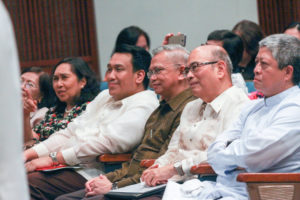
FLE is the only program of its kind that I know of. If it were a movie, I would not miss its premiere night! Because of time constraints, I will not dwell on how well provided we were in terms of the food served to us, the study venue, and the convenience of the over-all study experience, by way of the orderliness of the weekly distribution of materials both hard copy and online files via e-mail and the Google classroom. They were all excellent!
Let me go straight to the study experience itself.
FLE is a bold and ambitious program. And from the point of view of its Batch No. 1—our view—FLE has succeeded in that boldness and ambition. FLE opened our minds to the various philosophical foundations that tackle the family. Now, we clearly see that the family is not only the basic unit of our society but, more so, the repository of the society’s genetic development. What happens to the family may potentially happen to the state. Conversely, a morally disintegrated state could be triggered by the weakening of the morality of the families that comprise it.
We have been taught in social and cultural anthropology those nuances in the Filipino which have deep bearings from our colonial and feudal past. It was highlighted to us how strengthening the inner resolve of man—sometimes referred to as his mentality—can have more impact than working toward a reordered social structure.
In developmental psychology, we have learned that a balance must be achieved in the home so that the building of each other’s esteem will lead to character development, which is oriented toward service to humanity, instead of to individualism and entitlement.
In marital communications, we have understood that the quality of the relationship of the spouses can be influenced by both their natural predispositions, also called temperaments, and the different seasons that the marriage go through. It is to their advantage that the spouses constantly communicate with each other with these factors in mind. For oftentimes, when a marriage fails, it is said that the reason is not usually the spouses’ lack of love for each other but rather unresolved barriers to their communication.
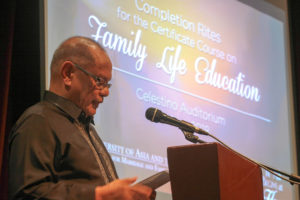
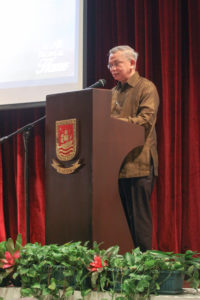
Finally, we have learned in ethics in family life that moral norms are objective standards whereas man’s actions are subjective choices. But by constant alignment of one’s subjective actions to the objective norms, a secondary nature, called habit (or virtue), can emerge.
But that’s not all. We had courses in law and public policy so that by understanding the law and how it is formed, we can effectively advocate life, marriage, and the family in that forefront of the public arena.
We were also given courses on people skills, counselling, and mentorship as well as home resources management, which, although practical in nature, are all founded on systematic sciences that ought to be learned with great benefit.
If you believe that what you have just heard from me about the FLE is interesting, relevant, or helpful, let me emphasize to you that what I have just mentioned were simply the “water droplets” from the strong, continuous, and broad “waterfalls”—the totality of the FLE—which we have been privileged to enjoy throughout this course.
In addition to the foundational courses and other content courses that I have mentioned, we were also exposed to various technical courses that increased our proficiency for research and content development as well as for curriculum design, delivery, and assessment of, at least, simple modules pertaining to Family Life. These basic research and curriculum methods will enable us to align our abilities with a core competency of this esteemed University, namely, research and communication. Our initiatives will not only be rich in content and methodical in development and delivery, but will also be supported by well-researched facts in the local context.
Indeed, all our teachers and mentors, individually and collectively, are experts and in their own disciplines. PhD holders, deans, and a university founder were among them, who are educated in prestigious universities here and around the world, respected authorities, speakers and practitioners of their respective fields. But most important of all, our teachers are themselves well-formed and have practiced for a long time what they have professed to us. We are truly grateful for the honor to be their students. That is why the agenda of this day will not be sufficiently covered if it was only a congratulations to the completers. More than ourselves, this day is a celebration of the trailblazing path that the IMFD and the SED (School of Education and Human Development) have paved for us; we simply walked on that well-paved path. At the forefront of that effort to pave our path are our teachers, maraming salamat po! Let me also mention in a special way Dr. Rina Villegas, a strong pillar of the FLE course, and her loyal assistant, the reliable Miss Rio Quiza. This day is a jubilation as well for the great vision that UA&P has and for its courage to pursue that vision!
Of course, the family members of the completers must be thanked too. There were certainly many untold sacrifices that you have to make because your spouse, your mom, your dad, your aunt or lola, your sister or brother, or your family member has been unavailable for the last 20 Saturdays. But we’re back now. With a renewed sense of vision, mission, and commitment. And we have resolved to help each other so that our congratulations today for finishing the course may be transformed into congratulations for having made good use of our newly gained empowerment!
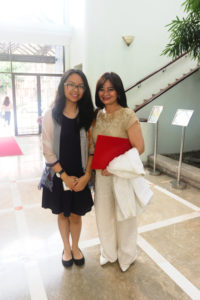
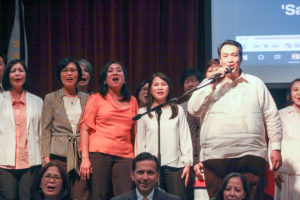
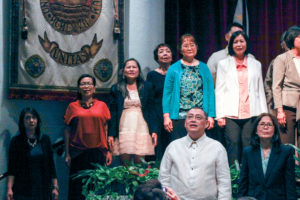
On a personal note, I turned 40 years old while I was in this course. FLE is my gift to myself on my 40th birthday. I cherish all the interactions that I had with my classmates—all accomplished in their own ways—as well as our teachers. That is why I am confident that I have entered 40 not in a state of “mid-life crisis,” which is often associated with this age, but rather in “mid-life clarity,” and I thank the FLE course.
Let me close this with an anecdote.
Months ago, while I was enjoying pizza and beer with a fellow professional, a foreigner who was visiting the country, the conversation somehow veered to this course that I have been taking for about two months then. “I didn’t know that one can make a course out of the family!” he said. I responded in the same jovial tone, “If you can make a course out of a pizza and beer, you can definitely make one that pertains to the family!” My punch line to him was like this: when the CEO of a corporation fails, the Board dissolves the corporation, saves the assets that can be salvaged and distributed, and closes the business. People will be stunned, but they will find new jobs and they will move on. When the father of a family fails and, wittingly or not, he dissolves the family, that leaves a permanent scar in the hearts of men, usually in children of tender ages. People will move forward, but there is no such thing as moving to another family. It becomes a tragedy that no one deserves.
If making pizza or beer, or the business of a CEO, deserves the close attention of academe, so does the family. Congratulations UA&P and fellow completers for taking on the work of building, scaffolding, sustaining, and supporting the most important organization in the whole world – the family.
To my fellow completers and pioneers, I raise my beer. Cheers! #
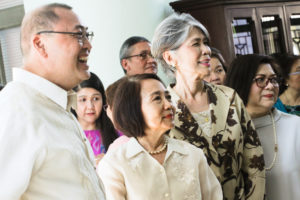
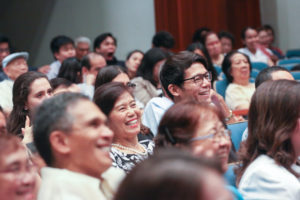
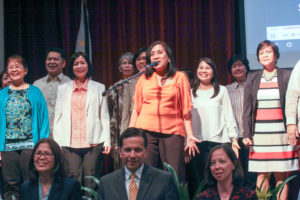
Famulus
Marie Cynthia C. Segura
God works in beautiful ways.
It was during this past Christmas season that my husband Rodrigo and I heard about this certificate course on Family Life Education: It All Begins at Home. We were put in contact with Dr. Rina Villegas, who came to our home on Christmas Eve to drop off the brochure and application forms, and here we are today.
Almost 20 years ago, my husband and I started our consulting practice, which focuses on people development through leadership training and executive coaching. Many times, we end up informally coaching people on family issues—spousal relationships, worries about raising children in these challenging times, sibling rivalries, and concerns on caring for elderly parents. This program (Family Life Education) has helped us become more prepared for these conversations, and better equipped with foundational knowledge and inspiration to share.
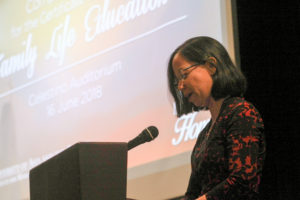
A month ago, a family friend who sat as a Board Member of a Fortune 500 company challenged my thoughts on the effort my husband and I have been exerting in trying to be a spark of change not only for our own families but also for this country by asking me if it was too late for the world to make a change for the better. Yes, sometimes it is daunting when you wake up and read the papers, watch the news, and listen to a lot of pessimism around. Can a person’s effort really make a difference? I firmly believe [that] YES, it can.
I shared with him a story about Ana, a girl I started mentoring nine years ago, when she was still in first year high school. Ana went to public school and almost quit several times because her parents could not find work most of the time, and there were five other siblings to take care of. They were kicked out of their four-by-four living quarters at least twice in a year because they were unable to pay the rent.
Fast-forward a few years. Ana graduated from high school and earned a certification from a two-year vocational program. She has worked hard in her job as a kitchen assistant and then as sous chef. She helped put her next older sibling through college, and both are now helping each other to do the same for the third sibling. She has also been able to buy a humble home for the family through a loan, which will be fully paid off next year. “Tita, [there would be] no more worries of being kicked out in the street in the middle of the night with our personal belongings in plastic bags,” she said to me.
YES, we can each make a difference!
Like Ana, we can be better leaders in our families. When we talk about being a “leader,” we think of the boss or the one who makes the ultimate decision. I would like to challenge that thought. When I looked up the word family because I was curious about its origin, I learned that it came into the English language in the 15th century. Its root lies in the Latin word famulus, which means “servant.”
How many of us can say that we SERVE our families with unconditional love? That we put our family members’ needs ahead of our own? That we go the extra mile for our spouse? That we exercise authority with compassion? That we do the right things to set the right example in leading our families to a good place? I have found 41 persons who I call classmates that can.
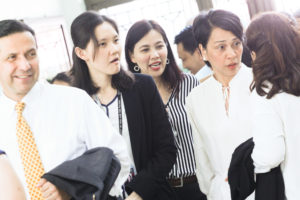
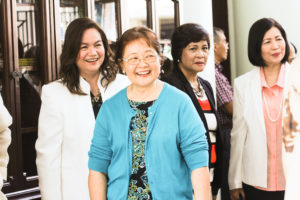
To my classmates and friends, thank you for sharing yourselves in this journey. I have faith that we will be seeing each other again soon.
To our professors and faculty who gifted us with their time and talent, muchisimas gracias.
To our families, who generously let us go each Saturday for our own growth and development, maraming salamat. #
Ms. Marie Segura is one of the founders of CMC Business Solutions, Inc., which started operations in 2002 in Manila, Philippines. CMC specializes in organizational development, people development, and cross-cultural coaching. Due to the nature of this work, Marie has specialized in soft skills and leadership development and has worked in various projects for a number of multinational organizations.
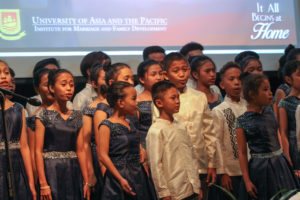
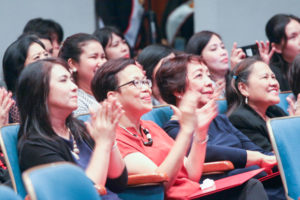
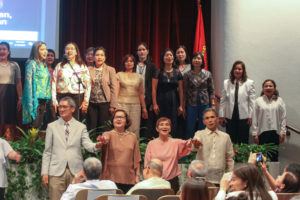
Leave a Reply